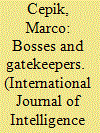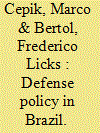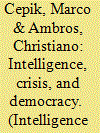|
|
|
Sort Order |
|
|
|
Items / Page
|
|
|
|
|
|
|
| Srl | Item |
| 1 |
ID:
155382


|
|
|
|
|
| Summary/Abstract |
Comparing intelligence services meets three recurrent challenges. Getting to know what is unique about specific organizations in different countries is always a powerful research driver. The general preference, then, is for insightful descriptive case studies. Second, the intricacy of the international security context and its dual level dynamics tend to drive off comparative studies. Third, the legal and practical impediments for researching organizations with secrecy and deception as constitutive features make evidence-based comparative assessments difficult. Indeed, intelligence might well be an odd subject for comparatists. Nonetheless, intelligence systems in different countries do undertake a similar set of missions and functions. They vary in terms of effectiveness and legitimacy according to the institutional history, political culture, and relative power and wealth of each country.
|
|
|
|
|
|
|
|
|
|
|
|
|
|
|
|
| 2 |
ID:
145857


|
|
|
|
|
| Summary/Abstract |
This article aims to analyze the Brazilian Defense Policy in terms of its ability to reduce the gap between ends and means. Since 2003, the Brazilian defense policy has evolved along with Brazil’s increased role in the international system. Sustaining this process depends on institutional, economic, and operational conditions that are yet to be fully guaranteed. They require negotiations, reforms, and strategic perspective. By identifying specific challenges emerging from the national security institutional framework, the combat capability building process, the budgetary cycle, as well as from the defense industrial base, we sought to explain their rationale and to offer concrete policy pointers to overcome obstacles. As a general conclusion, the Brazilian defense policy was strengthened by the 2008 National Defense Strategy (END) due to its clearer strategic goals. Bridging the gap between those ends and the proper means is a continuous effort for any given country, but in the case of Brazil it has been addressed with firmer steps since the END, even in the face of harder economic and political conditions.
|
|
|
|
|
|
|
|
|
|
|
|
|
|
|
|
| 3 |
ID:
132890


|
|
|
|
|
| Publication |
2014.
|
| Summary/Abstract |
This article analyzes why institutional crises are bound to happen and how they impact on national intelligence systems' development. Punctuated Equilibrium theory is reviewed and employed to explain one institutional crisis in each of Brazil, Colombia, South Africa, and India. In Brazil, the case study is the fall of the Brazilian Intelligence Agency (ABIN) director in 2008, following the Satiagraha operation conducted by the Federal Police Department (DPF). In Colombia, the 2009 wiretapping scandal known as chuzadas is examined. In South Africa, the investigation in Project Avani (2006-8) is reviewed. Finally, in India the case study is the intelligence crisis following the Mumbai terrorist attacks in 2008. We found that institutional crises are inevitable because there are tensions between security and democracy, both being co-evolutionary dimensions of successful contemporary state building. However, the impacts of such crises vary across the four cases pending on three variables: (1) degree of functional specialization inside the national intelligence system; (2) degree of external public control over the national intelligence system; (3) whether effectiveness, legitimacy or both were the main drivers of the crisis. Our analysis of the four case studies suggests that the amount of positive institutional change in the aftermath of an intelligence crisis is greater in countries with more functional specialization and stronger external control mechanisms.
|
|
|
|
|
|
|
|
|
|
|
|
|
|
|
|
|
|
|
|
|